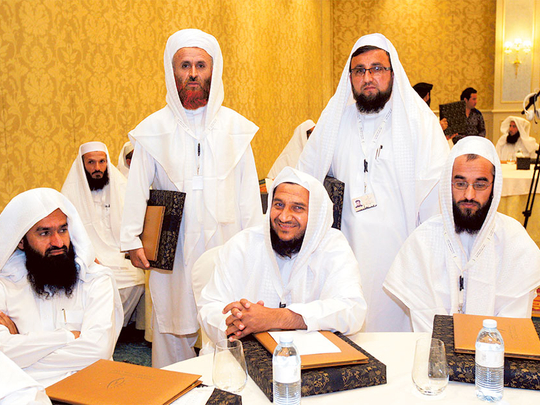
Abu Dhabi:
The UAE is committed to promote moderate Islam and counter and defeat extremism, focusing on invalidating extremist misinterpretations of Islam, said Mohammad Matar Al Kaabi, Chairman of the General Authority of Islamic Affairs and Endowments on Thursday.
Al Kaabi reaffirmed the UAE’s commitment to joining forces with other countries to fight extremism in all forms and reiterated the UAE’s role as a model of moderate Islam in the region.
He was speaking at the graduation ceremony of 32 Afghan mosque imams who received a fortnight-long training course at the Zayed House for Islamic Culture in Al Ain.
Al Kaabi said the religious training aims to instill the values of UAE’s open, moderate form of Islam in the next generation of Muslim religious leaders (imams) and preachers from across the region and the world.
“The religious training is a key element in UAE’s ongoing efforts to promote religious moderation and tolerance as a shield against extremism in the region,” Al Kaabi said.
The UAE first began its innovative programme to train imams as part of a comprehensive counter-radicalisation strategy, which also included launching the Muslim Council of Elders — an independent international body that aims to promote peace in Muslim societies, the Forum for Promoting Peace in Muslim Societies and Hedayah Centre which was established to serve as the premier international institution for training, dialogue, collaboration, and research to counter violent extremism.
Faidh Mohammad Othmani, Afghanistan’s Minister of Haj and Islamic Affairs, praised the UAE for its leadership role in the region, noting that the UAE plays a very important role in combating extremism.
“The UAE’s human-centred approach to promote moderate Islam, counterterrorism and promote security is a model for all Muslim countries. The UAE is offering religious training for more than 17,000 Afghan mosque imams, including women preachers and preachers for the police and army, which contribute to promoting tenets of moderate Islam and security across Afghanistan,” Othmani said.
Afghan imams stressed that the UAE’s multidimensional approach to fighting extremism and focusing on human development can be a model for other countries.
“The UAE is a model in promoting its politically moderate and tolerant interpretation of Islam that’s open to change and [is] reform-minded,” said Hamdullah Mustaqeem, a graduate of Islamic Sharia from Kabul University.
Obaidullah Afghani, 40, an Afghani imam, said given the widespread phenomenon of mosques and special religious sermons (khutbas) being misused for vested interests and political ends, this initiative should have long been taken in all parts of the Muslim world to prevent tarnishing of the image of Islam.
“We can successfully combat the menace of extremism if we engage imams in preaching sermons backing law and order of the country, speak out against radicals and their nefarious ends and focus on societal reforms in their sermons by urging the worshippers to avoid ideological extremism and uphold moderate interpretation of Islam,” Afghani said.
Hafeezullah Salam Mohammad, a graduate of Al Azhar University in Egypt, said imams should be educating the worshippers about the essential Islamic teachings and moral virtues; they should be addressing issues of moderation and extremism, national unity, social integrity, women’s rights, education system, youth issues, the rights of non-Muslims or even atheists and non-believers in an attempt to guide them on a right and moderate path.
“Training will help our imams, especially the moderate-minded, tackle current and vital issues of national and global concern,” Mohammad said.









